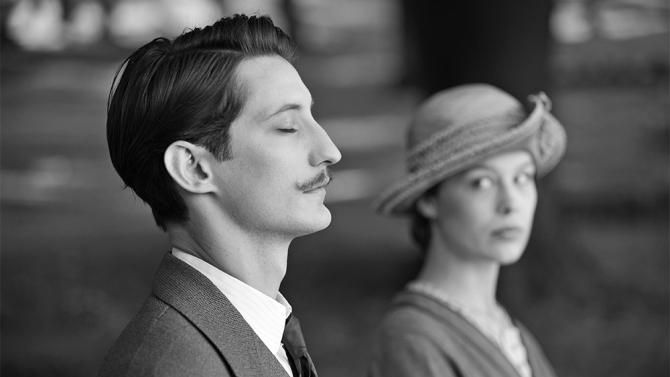In cinemas nationwide now.
Frantz may come as something as a surprise for those who have followed the career of François Ozon. Known for his playful, chaotic sensibility; his new film is a seemingly rigorously formal period melodrama about grief and acceptance. Look beneath the surface however, and there is an elegant narrative symmetry more akin to Kandinsky’s Concentric Circles than the Manet paintings it references so freely.
In a small German town in the aftermath of World War I, a young woman, Anna (Paula Beer) is coming to terms with the death of her fiancé, Frantz. She lives with his family, providing a modicum of solace for his devastated parents. She finds Adrien (Pierre Niney), a young Frenchman, visiting his grave. He reveals they were friends in pre-War Paris. Desperate for a living link to the man she loved, she is immediately charmed; as are Frantz’s parents after some reticence. However, Adrien may not be all he seems.
Loosely adapting an obscure Ernst Lubitsch film, Broken Lullaby, Ozon demonstrates once more that, like Pedro Almovodar, he’s at his best when his stories are female-driven. Beer is wonderful as a young woman who goes from stricken bereavement to driven detective; her enormous eyes containing multitudes, and our empathy is always with her. Niney’s lanky, almost awkward handsomeness lends itself to a particular interpretation of what drove his relationship with Frantz, but there are red herrings galore strewn throughout.
Underneath the romantic gloss Ozon is having a whale of a time. It’s a film about tall tales and unreliable narration. He bursts from sultry black and white to pastel colour in moments of heightened emotion or epiphany, but as these moments aren’t always genuine, he casts doubt on the efficacy of his own technique. The link to Manet’s work and visits to the Louvre is also a clue, as neither Le Suicidé nor Le Déjeuner sur l’herbe are housed there (though they may have been in 1919). Manet is buried in Passy Cemetery, which also becomes a destination for Anna in her attempt to track down the elusive Adrien.
The problem with all this postmodern trickery, as fun as it is to recognise and unpack, is that it does feel like the film lacks some genuine heart, which is an accusation that can’t be levelled at Ozon usually. For all the tricksy tangents that Swimming Pool or 8 Women haul the audience through, they never lack a pulsing soul. The mood of impending darkness that was beginning to surface from a humiliated Germany after 1918 is also hinted at, but perhaps could have been explored, particularly with the wells of guilt bubbling beneath the surface.
If you surrender to the beauty of the symmetrical storytelling however, and bask in the lovely cinematography, and Frantz will be firmly in the higher echelons of this prolific director’s work. His new film L’Amant Double will be in competition for the Palme d’Or at Cannes. As usual he’ll be one of the main attractions.
